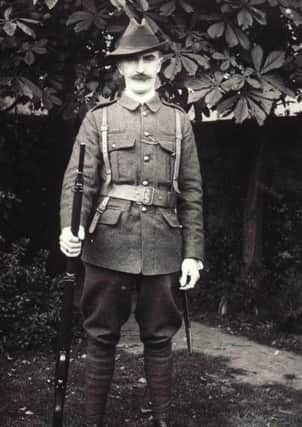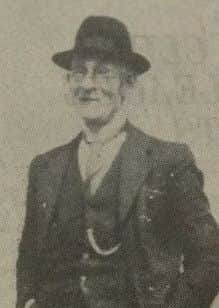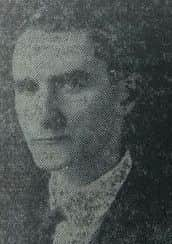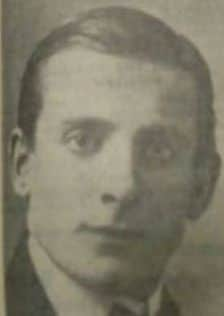Derry's part in the War for Irish Independence: Part 2


Here he follows on with the story of how this event played out in Derry.
“This action was resented by many of the Volunteers and a split followed. One section remained true to the old principles of breaking the connection with England and seeing the complete freedom of our oppressed land. With this high idea in mind a small section of the Irish Volunteers left the Shamrock Hall in Derry and proceeded to new quarters in Orchard Street. In spite of many obstacles they succeeded in carrying on. They forced out a branch of Cumann na mBann and a small company of Fianna Eireann. Irish classes were formed with lectures on Irish history. Concerts were held each Sunday night and I remember the splendid ceilidhthe we had.
Advertisement
Hide AdAdvertisement
Hide Ad“They were so conducted, that everyone young and old, throughly enjoyed them. The music was two violins, one played by Paddy Lafferty and the other by Hugh Devlin. The concerts were successfully planned by James McAuley and Joe Flanagan, the latter acting as MC. The programme consisted mainly of singing and dancing.Paddy Hegarty would give short talks on some pints of irish history and the objectives of the Irish Volunteers. The Volunteers would train and drill under Commandant Seamus Cavanagh, preparing for the day that was to come when Ireland would call her sons to arise.


“While these few people were energetically serving Ireland, the vast majority of the people in Derry and elsewhere in Ireland were being swept away by false promises and catch-cries. John Bull through his agents kept telling the Irish people that now they had Home Rule on the Statute Book they should don the khaki and fight for England and the rights of small nations. Recruiting offices were set up all over the city and English regimental bands played all the most beautiful Irish airs, such as ‘Remember the Glories of Brian the Brave’ and ‘The Wearing of the Green’.
“The nights were made colourful by torch lights and such was the manoeuvering of England’s agents that thousands of young Irishmen rushed to join her columns, believing that in doing so they were helping Ireland. But alas! Too few of them lived to know the truth and to realise the sacrifices were for England, not for Ireland.
“Would it be said that the people of Derry Colmcille would be found wanting when Ireland stood at her blackest period in history, when the whole Irish people seemed to have become English and nationality was reduced to a mere thread that was ready to break and plunge Ireland into an abyss of slavery for all-time. With the national spirit of Ireland gone, what would happen to future generations? God alone knew. But, thank God, there were men, women and boys in Derry, who in spite of small numbers would keep the flame of nationality burning even at the sacrifice of their own lives. These were the people who tore the hypocritical mask off the face of John Bull and showed him up for what he was, the same tyrannical brute who for over seven centuries had plundered and laid waste to the fair land of Eire-who applied the pitch-cap, the wrack and the gallows-tree, who robbed us of our what in ‘forty-seven and forced a famine on us.
Advertisement
Hide AdAdvertisement
Hide Ad“When the great country of France was overrun by English hordes, they set about dividing the people and causing confusion among them. They had almost succeeded when Joan of Arc began to receive Devine messages and finally a command-’Rise and oust the invader from your shore.’ This command came from Almighty God through the visitation of His angel. We in Ireland received no direct orders from Heaven but we knew in our hearts that our cause was as just and as holy as was the cause of France in 1428. That the foe who oppressed France was the self-same English foe that was trying by every hellish device to conquer us for hundreds of years.


“The Volunteers lost no opportunity in telling the young Irish men the reasons why they should not fight for England. They trued but all in vain to build up a string Volunteer force and things were such that they had become content with that small group, numbering in Derry, no more than forty.”
‘The O’Rahilly’
“On Nomber 23, 1915, they celebrated the anniversary of the Manchester Martyrs, and for that occasion, The O’Rahilly, a man who would later give his life for Ireland was brought from Dublin to give an oration.”
Michael Joseph O’Rahilly was a founding member of the Irish Volunteers in 1913 and served as Director of Arms. Despite opposing the action, he took part in the Easter Rising in Dublin and was killed in a charge on a British machine gun post covering the retreat from the GPO during the fighting.
Advertisement
Hide AdAdvertisement
Hide Ad

Liam Brady continued: “He arrived in Derry about two hours before he was due to speak. As I was told at the time, he got out of the train in which he was travelling at Strabane and proceeded to Derry by car arriving at the Metropole Hotel in Foyle Street, where he awaited the arrival of Seamus Cavanagh, the O.C., who with a small body of Volunteers acting as body-guard marched along Foyle Street and delivered The O’Rahilly safe at the John Mitchel Hall. The small group numbered no more than nine.
“The O’Rahilly lectured on the sacrifices of Allen, Larkin and O’Brien and said that the day was not far distant when Ireland would again call her sons and ‘if the Volunteers are not successful in this fight I hope I will not live to see another,’ he said.
First British ammunition
“A Derryman whose sympathies were with Ireland found himself in the British Army and while in Ebrington Military Barracks he manoeuvered to get some ammunition for the Volunteers. His chance came when the military were having one of their recruiting meetings with all the timmings, such as a large scale parade with a torch-light procession. They started from the barracks at 8 o’clock and the excitement was such that nearly all the soldiers met at the front gate to watch the line-up.


“At this time about 6,000 rounds of .303 ammunition was being handed over to the Volunteers who were waiting. They carried their parcels, formed up in the procession and marched with their friends the enemy through the Waterside, over the bridge, up Carlisle Road and broke with the procession at the top of Orchard Street. Then they made for the John Mitchell Hall and from there the ammunition was taken to a safe place. It eventually went to Dublin for the Rising. The soldier who secured the first supply of British ammunition for the Volunteers is still alive in Derry (circa 1953).”
John Mitchell Hall
Advertisement
Hide AdAdvertisement
Hide AdThe John Mitchell Hall was divided into two sections, the lower section was occupied by the Colmcille Pipers Band. The Volunteers had the upper portion. Tony Johnson was the caretaker and a very faithful and energetic supporter of the Irish cause he was. He was one of the first to distribute literature for the Volunteers in the city. There was a small shooting range with two small Winchester rifles with which the Volunteers practiced shooting. Cavanagh would teach them how to take a rifle to parts, clean it and put it back together. There seemed to be plenty of haversacks and bandoliers. The Hall was fitted with a small stage and had seating accommodation for about 70 although at times there was twice that number present. The Sunday night concerts were great entertainment with sketches. Amongst those who played the principal parts were William Sharkey, Mickey Wray, James McAuley, Frank McDevitt and Barney McGettigan. Mrs Cavanagh was in charge of the Cumann na mBann whose numbers were small-about 15. They organised the ceilidhthe, supplied refreshments and helped raised funds and many of them took parts in the plays and sketches. A number of them were fine singers indeed.”
Next week-Preparing the Fianna and the mobilisation orders for Easter 1916 arrive in Derry.